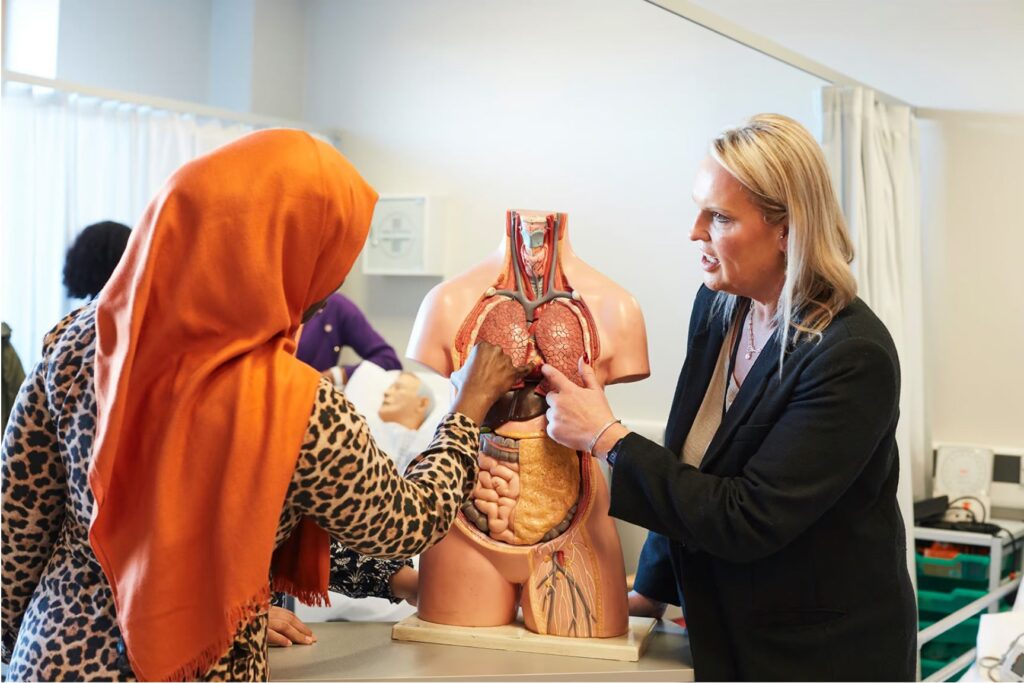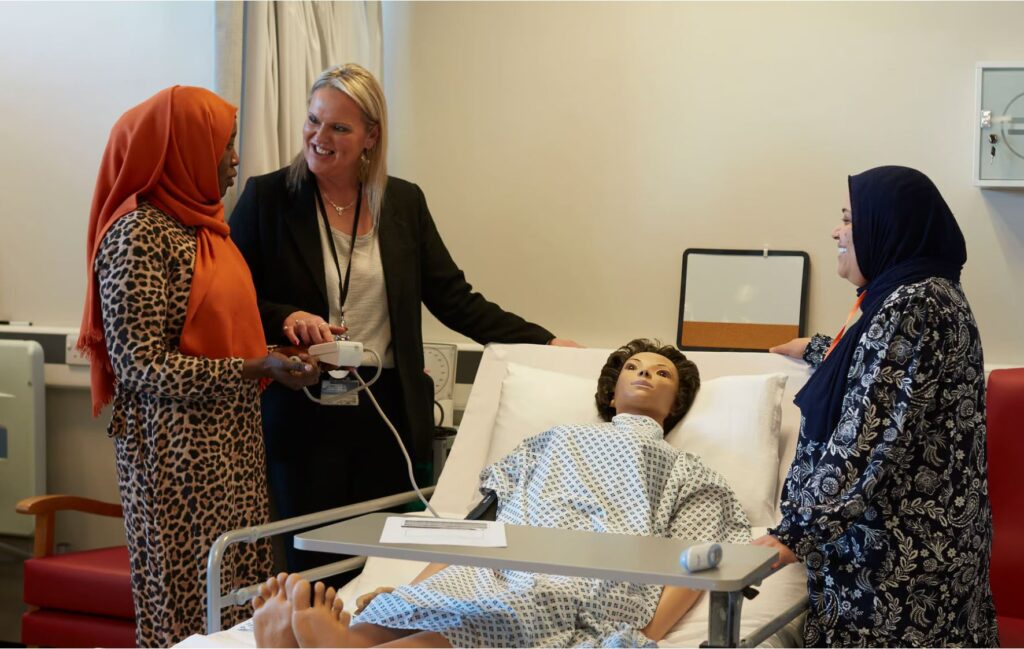By passing on her skills to the next generation of health and social care workers, further education teacher Denise Harris is inspiring her students to better support their patients – and preparing them for the world of work.
A few years ago, Denise Harris was in Warrington Hospital, awaiting cancer surgery. She was feeling anxious and scared – then a nurse arrived at her bedside. Both women gasped. The nurse was one of Denise’s former students.
“It was a shock, but so reassuring to have her caring for me; she is a brilliant nurse,” says Denise, a further education teacher who is now curriculum leader for health and social care at Bolton College. “She thanked me for preparing her for entering the real world and said that she now understood why I’d always pushed her to exceed her expectations of herself.”
This is exactly what further education (FE) teaching is all about – inspiring and training the next generation of workers in a wide range of industries, from health and social care to law, engineering, construction and many more. Further education encompasses all formal learning for those aged over 16 that isn’t part of an undergraduate or graduate degree, including students studying T Levels and adult learners looking to enhance their careers, do something different or pick up a new passion.
But this wouldn’t be possible without FE teachers. As the people who pass on their hard-earned industry skills, they are invaluable. Yet many industry professionals don’t realise they already have the skills and experience they need to start sharing them in further education – and can do so part-time alongside their existing career. Industry experience is usually the first thing FE recruiters look for. You don’t need a teaching qualification to get started as you can do teacher training on the job, so you can start earning straight away. Teaching in FE is also a great opportunity to stay in the industry you love while gaining more flexibility around your work life, with many part-time or flexible contracts available for professionals who wish to carry on with their career while teaching. But Denise’s main motivation for teaching in FE is giving her students the confidence to succeed.
WATCHING A STUDENT BLOSSOM AND DEVELOP A LOVE OF LEARNING – THAT’S THE REWARD
Denise Harris, Health & Social Care

“We live in difficult times,” she says. “It’s my job, as a further education teacher, to open up people’s horizons so they can see a bright future. My driving philosophy is to make education enjoyable for my students so that they are enthused and engaged.”
Denise can empathise with their struggles more than most, due to her own early experiences, which she is proud to have overcome. In fact, it was attending a further education college that was the making of her. “I was bullied at school, shattering my confidence,” she explains. “Without any enthusiasm for education, I did only OK in my exams. Then, after leaving sixth form, I took an office job I wasn’t really suited to.”
It was only when Denise became a mother in her mid-twenties, bringing up her daughter Laura largely on her own, that her attitude shifted. She wanted to be a positive role model for Laura and that meant finding fulfilment in a career.
Inspired by her experiences as a mum, she took a course in Early Years at Warrington FE College (now Warrington & Vale Royal College). That led to a career as a key worker for children on the child protection register, striving to keep families together, which she says was “full-on but rewarding”.
Denise then progressed to managing and developing community learning programmes for parents. At the same time, she studied for her Certificate of Education, during which she was assessed on giving parenting classes. “You’d make a really good FE teacher, Denise,” an assessor said one day.

That was 15 years ago, and Denise has never looked back. She’s since risen through the ranks to become, in September of last year, curriculum leader for health and social care at Bolton College. The department is buzzing. There are new courses on the curriculum, designed and taught by Denise, and a recently built replica of a real-life hospital ward where students can practise not just their medical knowledge but also soft skills such as how to reassure an anxious patient.
“I still keep my hand in with teaching because I love it,” Denise says. “And having a big input into the health and social care courses, like nursing, drawing on the skills I used as a key worker, has been really rewarding. I talk about the parenting classes I ran, how community healthcare providers can best engage with local councils and the laws around safeguarding, knowledge of which was essential to my role as a key worker.
“I remember the sense of fulfilment I felt after my first year as a further education teacher when a student thanked me for inspiring them. That’s the reward: watching a student blossom and develop a love of learning, just as I did a quarter of a century ago. Knowing that I’ve been part of sending them out into the world to care for people and do good is wonderful. That end-of-year ‘thanks, Denise’ never loses its thrill.”
As for that resolution she made all those years ago to be a positive role model for her daughter – Laura is now head of human resources and talent for an international company. And Laura’s daughter, Sophie, four, recently told Denise: “I want to be a teacher like you, Nanny.”
Until then, Denise is committed to encouraging other industry professionals into FE. “Through being a teacher in further education, you’re leaving a great legacy.”
Want to Go Further?
You don’t always need prior teaching experience to share your skills in further education – you can study for your qualifications while on the job. You just need real world experience and a desire to pass on that knowledge to the next generation of workers in your field – you can teach in subjects such as health and social care, digital and IT, engineering, manufacturing or law. You can even teach part-time or on an ad hoc basis while continuing in your existing career.
